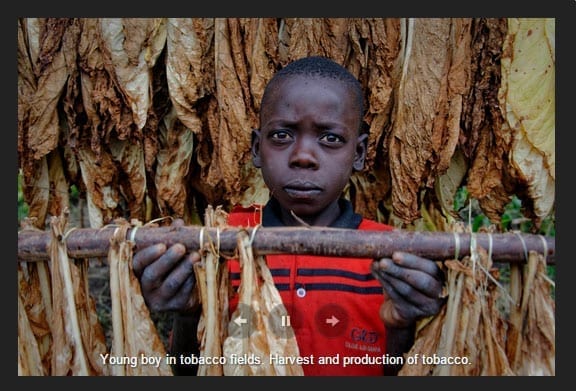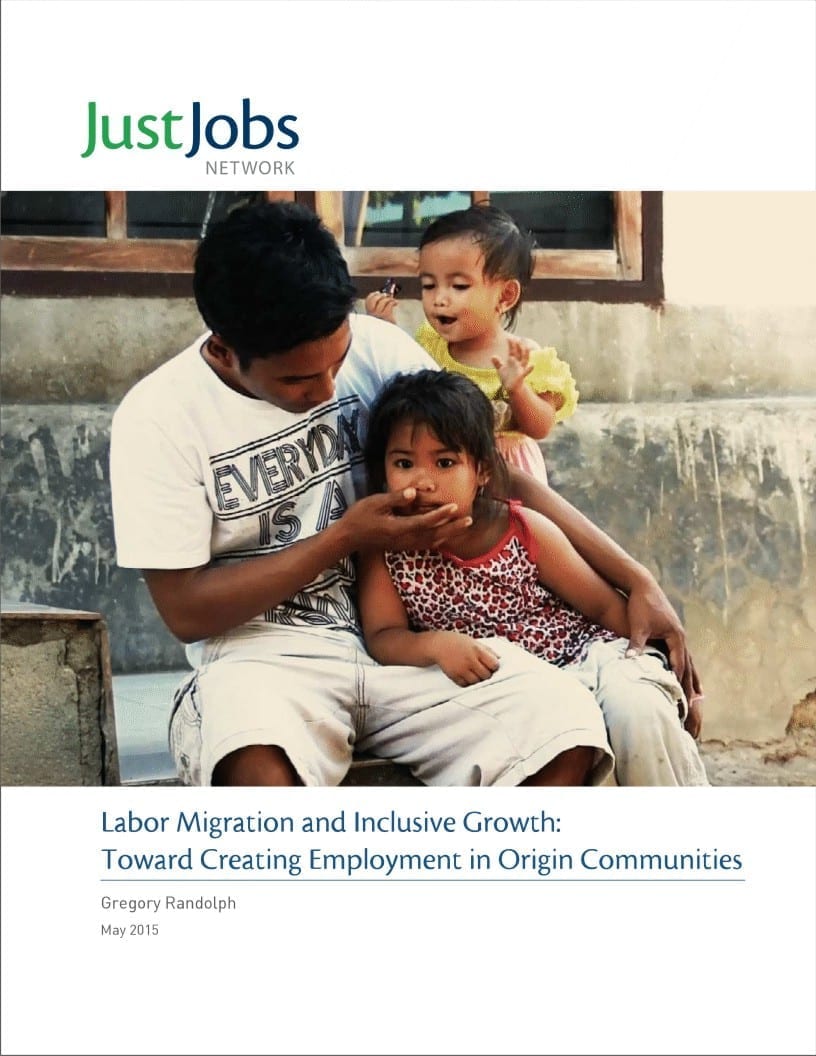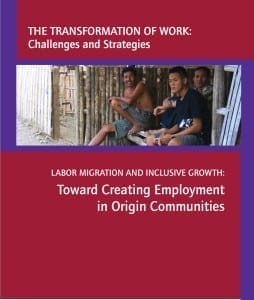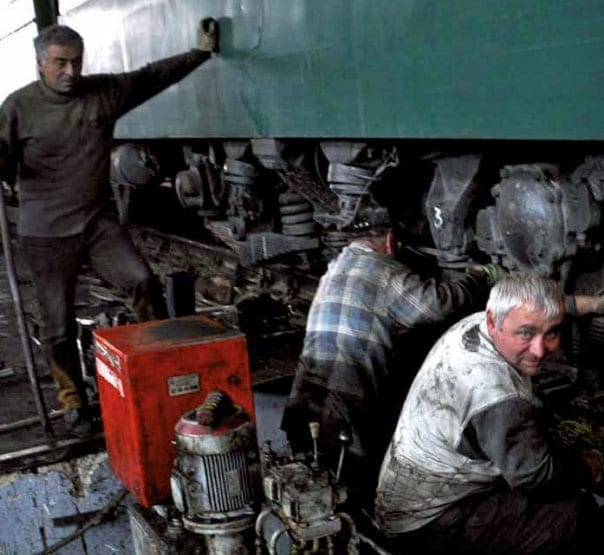
Jun 12, 2015
Some 168 million children remain trapped in child labor—11 percent of the world’s child population—even as 200 million youth in 2012 were working but earning less than $2 per day, according to an International Labor Organization (ILO) report released this week.
“Both child labor and the youth decent work deficit are symptomatic of the general lack of sustained, inclusive and sustainable economic growth in the global economy and in developing economies in particular,” according to the report.
Released in advance of World Day Against Child Labor June 12, the report focuses on the twin challenges of eliminating child labor and ensuring decent work for youth. “Achieving decent work for all will not be possible without eliminating child labor and erasing the decent work deficit youth face,” the report notes.
“World Report on Child Labor 2015: Paving the Way to Decent Work for Young People,” finds that at its core, child labor is about a lack of good jobs for adults—decent work with good wages and social protections that enables parents to support their families.
The report describes a self-perpetuating cycle of low-wage, low-skilled work opportunities that in turn provides no incentive for parents to keep their children in school because they have fewer reasons to delay their children’s entry into work and to incur the costs associated with their children’s schooling. Conversely, increased demand for skill translates into increased investment in education, the report finds.
The report also examines the worst forms of child labor, in which 85 million children under age 18 toil in hazardous work that directly harms their health, safety or moral development. Girls are especially vulnerable to worst forms of child labor, such as commercial sexual exploitation, and to hidden forms of child labor, such as domestic work outside their own homes.
Some 46.5 million adolescents age 15–17 years labor in hazardous work—40 percent of all employed 15–17 year-olds, according to the report.
Among them are child laborers in Ghana’s gold mines who pull the gold ore out of shafts, carry and crush loads of ore and process it with toxic mercury, according to a Human Rights Watch report also released this week.
“Precious Metal, Cheap Labor: Child Labor and Corporate Responsibility in Ghana’s Artisanal Gold Mines,” documents the use of child labor in Ghana’s unlicensed, mines, where most mining takes place. It is estimated that thousands of children work in hazardous conditions in violation of Ghanaian and international law.
Many local gold traders have done little to determine whether the gold they buy is produced with child labor, and regularly bought at unlicensed mining sites, where child labor often occurs, the report finds. The Ghanaian government-owned gold trading company, the Precious Metals Marketing Company, has no procedures to determine whether children have been involved in producing the gold it purchases. It provides trading licenses to about 700 buying agents and trading companies without obliging traders to use any human rights criteria, including regarding child labor, when purchasing gold.
Jun 11, 2015
As the FIFA corruption scandal widens and pressure builds to move the World Cup from countries tainted by the investigation, a deeper human tragedy may be unfolding: The economically fragile situation of migrant workers who build infrastructure for global sporting events will only worsen if they lose their jobs abroad and have no employment to return to at home, writes the Solidarity Center’s Sonia Mistry.

Jun 11, 2015
The global economy generally is unregulated and the system encourages multinational corporations to operate or source from countries where wages are low, laws to protect human rights are few or unenforced and workers are impoverished and vulnerable, Shawna Bader-Blau, Solidarity Center executive director, said before the Canadian Parliament Monday.
“Unfortunately, the horrifying working conditions that led to the Rana Plaza collapse and the deadly Tazreen Fashions fire just six months prior are not unique to Bangladesh. In developing countries around the world, we see building codes go unenforced, and health and safety standards ignored,” Bader-Blau told the Senate Standing Committee on Human Rights.
The Canadian Senate committee held the hearing, “Corporate Social Responsibility and Garment Workers,” to monitor human rights issues and to review how the Canadian government addresses its international and national human rights obligations.
Bader-Blau emphasized that improving workplace conditions above all requires involving working people in the process—and that means workers must be able to form unions and bargain over their wages and working conditions with employers.
She recommended several steps to address the growing global crisis in which low wages, few jobs and exploitative working conditions increasingly becomes the norm. Governments “have important tools to improve human rights conditions for workers, including trade arrangements and legal requirements for accountability in supply chains,” she said.
Further, global corporations must support the human rights of their workers. As a start, global corporations should “fully embrace the United Nations guiding principles on business and human rights as a floor and aggressively move their implementation across the supply chain,” Bader-Blau said.
“Treat human rights with a level of priority you treat pricing and quality control. Global corporations have figured out how quality control can be maintained across their supply chain. How about worker rights?”
The bottom line, she said, is that no amount of legally unenforceable, nicely worded social-responsibility promises is ever going to resolve the abuses perpetuated on a vulnerable workforce.
“Rather, workers’ ability to organize and collectively raise concerns to management because they have the strength of a union is the only realistic approach to ensuring that they know and can exercise their rights. Without a union, individuals who complain can be threatened, fired or even killed into silence. Together, they are a force for improvement.”
Others testifying before the committee included Shannon Brown, Fairtrade Canada Business Development and Commercial Relations director; Sofia Molina, Fairtrade Canada category specialist for coffee; and Bob Jeffcott, co-founder and policy analyst for the Maquila Solidarity Network.
See Bader-Blau’s full testimony, starting at 77:55.

Jun 10, 2015
 Governments of migrants’ countries of origin could be doing much more to harness the phenomenon of labor migration toward inclusive growth, according to a new report that investigated high-migration communities in Indonesia.
Governments of migrants’ countries of origin could be doing much more to harness the phenomenon of labor migration toward inclusive growth, according to a new report that investigated high-migration communities in Indonesia.
The study, which examined the role of labor migration in achieving the aims of an inclusive growth agenda in origin countries, looked at communities in West Nusa Tenggara, the Indonesian province that sends the highest ratio of its population for overseas work. It found that wages sent home by Indonesians who migrate for work are not supporting local job creation in origin communities. Further, it finds that the poorest communities in Indonesia are most likely to send migrants into informal economy jobs.
“Remittance capital (the money sent home by migrant workers) has not stimulated broad-based economic development complete with an increase in job opportunities … in spite of migration from these localities of more than 30 years,” the report states. As a result, “community members cannot envision a future in which the demand to migrate has ceased.”
“Labor Migration and Inclusive Growth: Toward Creating Employment in Origin Communities” also found that Indonesian workers’ main incentive for migrating out of the country is not dire poverty nor lack of jobs at home but a lack of just jobs—those that provide a stable salary and opportunities for economic mobility.
While Indonesia is facilitating a slow transition in its overseas workforce from informal economy work to jobs in the formal economy, migrants from West Nusa Tenggara, who are among the poorest and primarily women, still have few options except jobs as domestic workers. The uneven pattern of international migration across the country is a result of inequitable access to education, training and capital across regions at home.
While Indonesia is facilitating a slow transition in its overseas workforce from informal economy work to jobs in the formal economy, migrants from West Nusa Tenggara, who are among the poorest, are primarily women and still wind up in jobs as This uneven pattern of international migration across the country is a result of uneven access to education, training and capital across regions at home.
“The [Indonesian] government sees return migrants primarily as consumers rather than producers. Moreover, it values remittances more for their ability to improve Indonesia’s balance of payments and reduce foreign exchange shortages, rather than for their potential to serve as start-up capital for job-creating enterprises,” the report notes.
The report concludes that an “economic growth agenda in countries like Indonesia that does not entail a roadmap for creating employment opportunities in communities of origin lacks inclusivity.”
JustJobs Network produced the report, supported by the Solidarity Center with U.S. Agency for International Development funding. The report is part of the Center’s Transformation of Work research series, which is designed to expand scholarship on and understanding of issues facing workers in an increasingly globalized world, and supports the efforts of the Solidarity Center and its partners to document challenges to decent work and the strategies workers and their organizations engage to overcome those challenges.
See all Solidarity Center-supported reports on migration.

Jun 10, 2015
Belarus, China and Colombia are countries with the worst worker rights violations in the world, while the Middle East and North Africa is the world’s worst region when it comes to fundamental rights at work, according to the 2015 Global Rights Index released today.
“Workers in Colombia and Guatemala have been murdered for trying to negotiate better working conditions, while in Qatar and Saudi Arabia migrants continue to endure forced labor and labor law exclusions which amount to modern slavery,” says Sharan Burrow, general secretary of the International Trade Union Confederation (ITUC), which issued the report. Union members were murdered in 11 countries, an increase of one from the last report, including 22 deaths in Colombia alone.
The other top 10 worst countries for working people are Egypt, Guatemala, Pakistan, Qatar, Saudi Arabia, Swaziland and United Arab Emirates.
“In 73 of 141 countries, workers faced dismissals, suspensions, pay cuts and demotions for attempting to negotiate better working conditions, while in 84 countries employers adopted illegal strategies to deny or delay bargaining with representative trade unions,” says Burrow.
The report notes a worrying trend in the “immense increase in the number of arbitrary arrests and detentions of workers for exercising their rights in a legitimate and peaceful manner” with the number of countries where such violations were reported rising from 35 in 2013–2014 to 44 in 2014–2015 and now includes countries such as Spain and Brazil.
The Index ranks countries based on the frequency with which worker rights are violated, and finds that worker rights in eight countries have diminished since last year: Burundi, Dominican Republic, Hong Kong, Special Administrative Region of China, Iran, Georgia, Russia, United Kingdom and Spain.
Five countries received perfect scores: Austria, Finland, Netherlands, Norway and Uruguay. The report finds that two countries, Mozambique and Lesotho, have made notable improvements.
“The World’s Worst Countries for Workers” also finds:
- In nearly 60 percent of the 141 countries ranked, certain categories of workers are excluded from fundamental labor rights.
- 70 percent of countries deny the right to strike to some or all workers.
- Two-thirds of countries deny workers collective bargaining rights.
- More than half of countries in the survey deny workers access to the rule of law.
The report, which the ITUC has issued annually for the past 30 years, connects deteriorating worker rights and inability to freely form unions with the world’s increasing global economic inequality, where more than 1.2 billion people live in extreme poverty.
Download the full report, which includes a country-by-country description, maps and graphics.




 Governments of migrants’ countries of origin could be doing much more to harness the phenomenon of labor migration toward
Governments of migrants’ countries of origin could be doing much more to harness the phenomenon of labor migration toward 